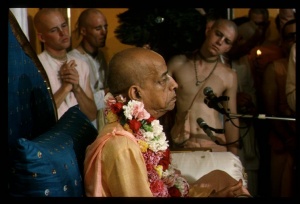SB 10.49.17: Difference between revisions
m (1 revision(s)) |
(Vanibot #0018 edit: make synonym terms in Sanskrit italic in SB - Vanisource) |
||
| Line 1: | Line 1: | ||
{{info | {{info | ||
|speaker= | |speaker=Akrūra | ||
|listener=King | |listener=King Dhṛtarāṣṭra | ||
}} | }} | ||
[[Category:Srimad-Bhagavatam - Canto 10 Chapter 49]] | |||
[[Category:Bhagavatam Verses Spoken by Akrura - Vanisource|104917]] | |||
<div style="float:left">'''[[Srimad-Bhagavatam]] - [[SB 10|Tenth Canto]] - [[SB 10.49: Akrura's Mission in Hastinapura|Chapter 49: Akrūra's Mission in Hastināpura]]'''</div> | |||
<div style="float:right">[[File:Go-previous.png|link=SB 10.49.16]] '''[[SB 10.49.16]] - [[SB 10.49.18]]''' [[File:Go-next.png|link=SB 10.49.18]]</div> | |||
{{RandomImage}} | |||
{{SBnotice}} | |||
==== TEXT 17 ==== | ==== TEXT 17 ==== | ||
<div | <div class="verse"> | ||
akrūra uvāca | :akrūra uvāca | ||
bho bho vaicitravīrya tvaṁ | :bho bho vaicitravīrya tvaṁ | ||
kurūṇāṁ kīrti-vardhana | :kurūṇāṁ kīrti-vardhana | ||
bhrātary uparate pāṇḍāv | :bhrātary uparate pāṇḍāv | ||
adhunāsanam āsthitaḥ | :adhunāsanam āsthitaḥ | ||
</div> | </div> | ||
| Line 18: | Line 23: | ||
==== SYNONYMS ==== | ==== SYNONYMS ==== | ||
<div | <div class="synonyms"> | ||
akrūraḥ | ''akrūraḥ uvāca''—Akrūra said; ''bhoḥ bhoḥ''—O my dear, my dear; ''vaicitravīrya''—son of Vicitravīrya; ''tvam''—you; ''kurūṇām''—of the Kurus; ''kīrti''—the glory; ''vardhana''—O you who increase; ''bhrātari''—your brother; ''uparate''—having passed away; ''pāṇḍau''—Mahārāja Pāṇḍu; ''adhunā''—now; ''āsanam''—the throne; ''āsthitaḥ''—have assumed. | ||
</div> | </div> | ||
{{SBcollapse}} | |||
==== TRANSLATION ==== | ==== TRANSLATION ==== | ||
<div | <div class="translation"> | ||
Akrūra said: O my dear son of Vicitravīrya, O enhancer of the Kurus' glory, your brother Pāṇḍu having passed away, you have now assumed the royal throne. | Akrūra said: O my dear son of Vicitravīrya, O enhancer of the Kurus' glory, your brother Pāṇḍu having passed away, you have now assumed the royal throne. | ||
</div> | </div> | ||
| Line 32: | Line 37: | ||
==== PURPORT ==== | ==== PURPORT ==== | ||
<div | <div class="purport"> | ||
Akrūra was speaking ironically, since the young sons of Pāṇḍu should actually have been occupying the throne. Upon the death of Pāṇḍu, they were too young to immediately govern and so were put in Dhṛtarāṣṭra's care, but now sufficient time had passed, and their legitimate rights should have been recognized. | Akrūra was speaking ironically, since the young sons of Pāṇḍu should actually have been occupying the throne. Upon the death of Pāṇḍu, they were too young to immediately govern and so were put in Dhṛtarāṣṭra's care, but now sufficient time had passed, and their legitimate rights should have been recognized. | ||
</div> | </div> | ||
__NOTOC__ | </div> | ||
</div> | |||
<div style="float:right">[[File:Go-previous.png|link=SB 10.49.16]] '''[[SB 10.49.16]] - [[SB 10.49.18]]''' [[File:Go-next.png|link=SB 10.49.18]]</div> | |||
__NOTOC__ | |||
__NOEDITSECTION__ | |||
Revision as of 15:59, 1 December 2017

A.C. Bhaktivedanta Swami Prabhupada
Please note: The synonyms, translation and purport of this verse were composed by disciples of Śrīla Prabhupāda
TEXT 17
- akrūra uvāca
- bho bho vaicitravīrya tvaṁ
- kurūṇāṁ kīrti-vardhana
- bhrātary uparate pāṇḍāv
- adhunāsanam āsthitaḥ
SYNONYMS
akrūraḥ uvāca—Akrūra said; bhoḥ bhoḥ—O my dear, my dear; vaicitravīrya—son of Vicitravīrya; tvam—you; kurūṇām—of the Kurus; kīrti—the glory; vardhana—O you who increase; bhrātari—your brother; uparate—having passed away; pāṇḍau—Mahārāja Pāṇḍu; adhunā—now; āsanam—the throne; āsthitaḥ—have assumed.
Translation and purport composed by disciples of Śrīla Prabhupāda
TRANSLATION
Akrūra said: O my dear son of Vicitravīrya, O enhancer of the Kurus' glory, your brother Pāṇḍu having passed away, you have now assumed the royal throne.
PURPORT
Akrūra was speaking ironically, since the young sons of Pāṇḍu should actually have been occupying the throne. Upon the death of Pāṇḍu, they were too young to immediately govern and so were put in Dhṛtarāṣṭra's care, but now sufficient time had passed, and their legitimate rights should have been recognized.